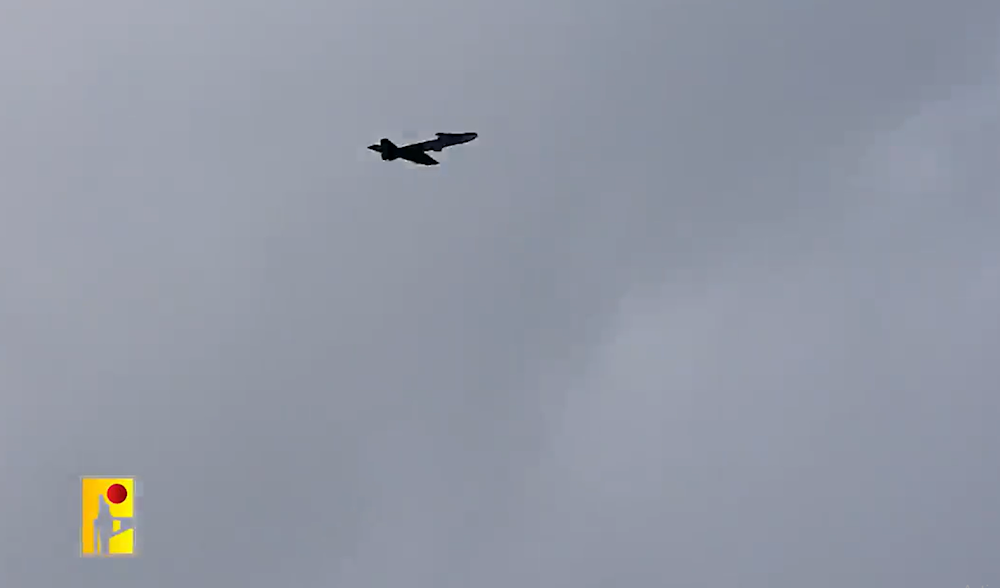Hezbollah drones constitute 'new generation of unconventional threats'
A new Washington Post report highlights how Hezbollah's drones can evade Israeli air defences and gather sensitive intelligence, significantly altering the strategic balance.
-

A screenshot from a Hezbollah military media video showing the launch of a drone at the beginning of the Hoopoe Mission video on June 18, 2024. (Hezbollah Military Media)
In a new report on Hezbollah's drones and the threat they pose to "Israel's" security, The Washington Post stressed their particular ability to evade Israeli air defense systems without being detected.
The report stated that "For years, the standoff on Israel’s border was between the massive rocket stockpile" of Hezbollah and the "vaunted Iron Dome antimissile system that ably handled most incoming rockets and artillery." However, this equation changed after Hezbollah deployed drones that successfully bypassed Israeli air defense, which also constitutes the cornerstone of "Israel's national security strategy."
These drones are characterized by their high speed and low altitude flight, allowing them to gather intelligence and drop explosives.
In its coverage of the Hoopoe mission video released by the Islamic Resistance in Lebanon's Military Media on Tuesday, The Washington Post noted that "Israel" was shocked by what the drone captured of sensitive installations and sites in "Israel," and by the advanced military capabilities that the video showed Hezbollah possesses.
The report continued, "Hezbollah’s small, remote-controlled drones — believed to be simply bought over the counter — can operate independent of radio signals. Some can fly up to 125 mph. They can fly low to the ground, and can manoeuvre around the mountains and into the canyons along the border, skimming through the blind spots in Israel’s detection web."
The newspaper pointed out that the biggest test for Israeli air defense came after Iran's response to the bombing of its consulate in Damascus last April.
Onn Fenig, the CEO of R2, an Israeli signal processing and machine learning start-up, said, "The Iranian attack was also a one-off event, and raised questions around Israel’s ability to handle, or afford, an attack that would have been more sustained."
He added, "In the post-Oct. 7 world, Israel and its allies would need to leverage its military technology to deal with a new generation of unconventional and at times paradoxical threats."
Moreover, Fenig "If you’re strong and you have budget, you don’t have the upper hand," adding that "There’s no one solution in this dramatically changing battlefield. It’s all very problematic."
Experts decode messages in Hezbollah's Hoopoe mission video: Exclusive
Hezbollah's video ended with the phrase "and the birds as they soar," which suggests that the Lebanese Resistance group's drones are still flying in the airspace of occupied Palestine, expert sources told Al Mayadeen on Tuesday.
Earlier, the Military Media of the Islamic Resistance in Lebanon - Hezbollah released Tuesday footage showing its reconnaissance drones flying over swathes of occupied Palestinian land, including Kiryat Shmona, Nahariya, Safad, Karmiel, Afula, all the way to Haifa and its port.
Titled "This is what the Hoopoe came back with," the nine-minute-and-a-half video captured footage and exposed sensitive Israeli sites. Hezbollah highlighted that its drones bypassed Israeli air defenses and returned to Lebanese airspace without being detected.
The sources said that the Hoopoe of the Islamic Resistance in Lebanon appears flying over the most sensitive installations, not just the Haifa military base.
They highlighted that one of the most important things documented by the Hoopoe is the area of the military-industrial complex affiliated with the Rafael Company, which is an extremely sensitive area.
The sources explained that companies and websites specialized in aerial and industrial imaging refrain from publishing any updated images at the request of the Israeli government due to their sensitivity.
In the same context, the experts told Al Mayadeen that Hezbollah's video includes three types of potential targets: military (the Military-Industrial Complex and the Haifa Military Base), civilian (the Krayot area), and strategic (Haifa Port and its facilities).
They added that the three types of potential targets are meant to establish a three-dimensional balance of deterrence against "Israel", with each dimension relating to the type of target "Israel" may strike in any confrontation with Lebanon.
"Hezbollah wanted to say that [the equation is] military for military, civilian for civilian, and strategic for strategic," the sources pointed out.
Touching on the details of the video, the experts explained that the missile illustrated next to the target card has guiding fins at its front, symbolizing a precise missile, which is a message Hezbollah intended to convey in the video.
They noted that the red missile illustrated next to the identification card of Haifa Port indicates that Hezbollah treats this site with a high level of seriousness in terms of potential targeting.
According to the experts, this video is only the first episode in a series yet to come, with subsequent episodes showing how far the Resistance's reconnaissance drones have reached inside occupied Palestinian airspace.
Elsewhere, the sources told Al Mayadeen that the timing of releasing the video is undoubtedly linked to the visit of US envoy Amos Hochstein to Lebanon on a mission "of Israeli nature" even if it appears as part of a mediation effort.
Earlier, Hochstein called for an immediate de-escalation of tensions on the northern border between Lebanon and "Israel".
Read more: Resistance to know no bounds if Lebanon attacked: Sayyed Nasrallah

 5 Min Read
5 Min Read








